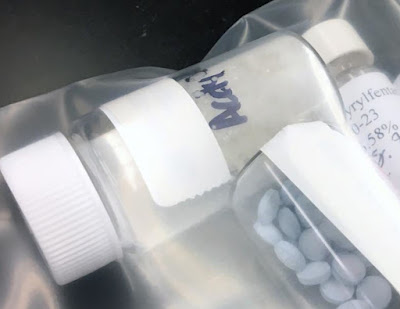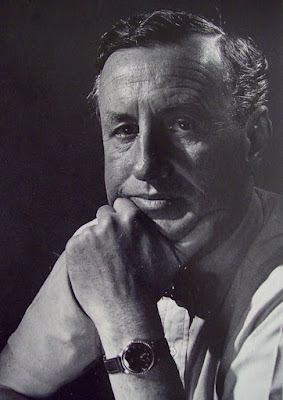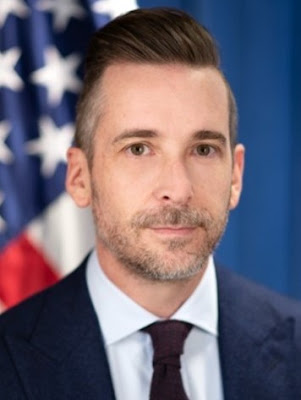You can read the piece via the below link or the below text:
Paul Davis: Drug trafficking from China, with love (broadandliberty.com)
The late, great thriller writer Ian Fleming, author of such classic James Bond thrillers as From Russia With Love, Goldfinger and Dr. No, also wrote a short story about drug smuggling called Risico.
In Risico, James Bond is given the assignment to break up a drug smuggling ring in Italy. M, the chief of the British Secret Service in the Bond stories, tells Bond drug trafficking can be an instrument of psychological warfare, as drug addiction saps a country’s strength. He stated that subversion and not money may be at the back of it.
“In this pizniss
is much risico,” the drug smuggler Kristatos tells James Bond at the beginning
of the short story.
The Italian criminal Enrico Colombo, who smuggles cigarettes and other items — but not drugs — aids Bond in destroying a cache of Kristatos’s drugs. Colombo tells Bond that the drug shipment they had just destroyed was a gift from Russia. He explained that Kristatos ran the drug ring that smuggled heroin into the United Kingdom, but the Soviet Union provided him with the drugs.
Ian Fleming (seen in the above photo) admitted that the plots in his novels were fantastic (the films much more so), but he also said they were based on the real world of intelligence.
I thought of Ian Fleming’s Risico when I read the remarks by Matthew Millhollin — the assistant director of Homeland Security Investigations, Immigration and Customs Enforcement Department of Homeland Security — at a hearing on combating transnational criminal organizations and the trafficking of humans, narcotics, and firearms.
Appearing before the committee on May 3, Millhollin (seen in the below photo) spoke of the Chinese connection to the Mexican cartels who import heroin and other drugs, including the lethal drug fentanyl, which are devastating and killing drug addicts in Kensington, other parts of Philadelphia, and across the country.
"As the principal
investigative component of the Department of Homeland Security (DHS), HSI is
responsible for investigating transnational crime. In collaboration with its
partners in the United States and abroad, HSI special agents develop evidence
to identify and advance criminal cases against transnational criminal
organizations (TCOs); terrorist networks and facilitators; and other criminal
elements that threaten the homeland,” Millhollin told the committee. “HSI works
with prosecutors to arrest and indict violators; execute criminal search
warrants; seize criminally derived money and assets; and take other actions
with the goal of disrupting and dismantling TCOs operating throughout the
world.”
Millhollin added
that TCOs have evolved beyond insular entities and have sought out partnerships
with competing TCOs in furtherance of their criminal activities.
“For example, the
illicit collaboration between Chinese TCOs and Mexican cartels have created a
complex criminal ecosystem that is fueling money laundering and narcotics
trafficking, specifically illicit fentanyl, operations into and within the
United States. Chinese money laundering organizations (MLOs) have developed
sophisticated networks in the United States, Mexico, China, and throughout Asia
to facilitate three money laundering schemes,” Millhollin explained.
“These
organizations utilize their vast global infrastructure to clean illicit
proceeds for various criminal organizations, including Mexican cartels.
Moreover, as Mexican cartels have taken over fentanyl production and operate on
an industrial scale, they are procuring precursor chemicals from China and
synthesizing these chemicals in Mexico to produce fentanyl. Mexican cartels
then smuggle the fentanyl into the United States in either powder or pill form
for distribution.”
Millhollin stated
that HSI was attacking this illicit narcotics supply chain through an
intelligence based counternarcotics operation that blends traditional
investigative and analytical techniques with interagency collaboration,
industry partnerships, and computer-based tools.
“Chinese criminal organizations also facilitate the trafficking and distribution of illicit fentanyl pills. The most common is fake oxycodone pills, which are made to look identical to prescription oxycodone but are laced with deadly fentanyl. These fake pills are responsible for thousands of overdose fatalities, as the user believes they are taking a real oxycodone pill and unknowingly receives a lethal dose of fentanyl. In order to manufacture these pills, Mexican cartels require industrial pill press equipment to turn powdered fentanyl into pill form. The Mexican cartels are purchasing these pill presses directly from Chinese manufacturers who are producing the equipment specifically for illicit activity.
“HSI is actively
disrupting the pill press supply chain, and to date has seized over 1,200 pill
presses and parts used to make deadly fentanyl-laced pills. Moreover, TCOs,
particularly those along the Southern Border, have employed a multipronged
illicit business model encompassing the importation of narcotics into the
United States and exportation of illicit firearms and ammunition to Mexico.”
Millhollin stated
further that HSI has developed a multidiscipline approach to combating the flow
of illicit drugs into the United States which includes countering the flow of
illicit firearms and ammunition into Mexico.
Mexican President López Obrador also claimed fentanyl is being bought by Mexican gangs from suppliers in China. Chinese foreign ministry spokesperson Mao Ning denied the claim and stated there was no such thing as illegal trafficking of fentanyl between China and Mexico.
“China has not been notified by Mexico of the seizure of scheduled fentanyl precursors from China,” she said.
This was plainly
a dodge, as drugs listed in “schedules” are legal shipments subject to a number
of official government restrictions, while “unscheduled” — smuggled by
criminals — are not.
Mao Ning said the
widespread fentanyl abuse in the US was a problem completely made in
America.
Although
Millhollin spoke of Chinese transnational crime organizations, he did not
suggest the Communist Chinese Government was involved in the exporting of
fentanyl or turned a blind eye. But others have, and I suspect it is so.
Just as the
Soviet Union was the villain providing drugs to traffickers so that drugs would
undermine the United Kingdom in Ian Fleming’s Risico,
I wonder if the Communist Chinese Government allows their criminal gangs to
ship fentanyl to Mexico and then on to the United States in an effort to
undermine America.
Paul Davis, a Philadelphia writer and frequent contributor to Broad + Liberty, also contributes to Counterterrorism magazine and writes the On Crime column for the Washington Times.





No comments:
Post a Comment